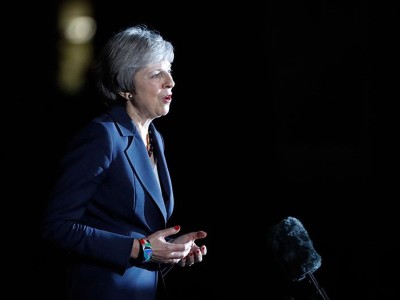
Damage to science could still be minimized in the Brexit negotiations.Credit: Dan Kitwood/Getty
The Daily Express UK tabloid newspaper has been one of the loudest voices to argue that Britain should exit the European Union. But last week it admitted that the move could have some downsides. In what it labelled as a “BREXIT BOMBSHELL”, the paper reported the fears of industry scientists that: “Leaving the EU will be bad for UK science.”
No arguments here. Long before the 2016 referendum and the bitter disputes that have followed, it was clear that the United Kingdom’s membership of the political bloc benefits its research in numerous ways. (And European science benefits from Britain’s input, as well.) Leading figures and Nobel prizewinners have queued up to say the same. But although the Daily Express bombshell might not be news to Nature readers, its publication should remind researchers in Britain and elsewhere that what is obvious to them is not so to everyone. Some messages bear — indeed, demand — repetition, and the unnecessary damage that Brexit will cause to research is one of them. The need to continue to emphasize this message is especially crucial as political negotiations on how and when Britain severs its ties with the EU approach the end game.
Brexit: what the draft deal means for science
The Brexit waters remain murky, but the superstructure of a possible ‘divorce’ deal that would set the terms of Britain’s withdrawal is just about visible through the gloom. Last week, the British government and the EU produced a 585-page document that marks their joint attempt to set the terms. It’s a draft of a deal, and the current alternative to a ‘no-deal’ scenario. The British public got to see it only after a fractious meeting of members of the ruling Cabinet had approved the wording — only for some Cabinet members to then promptly resign.
Anyone brave enough to read the full tome will find few references to science (and few were expected). It largely covers the thorny matters of Britain’s divorce bill and a political and trading mechanism to avoid having to reinstate a hard border with Ireland. It leaves most of the key issues that are important for scientists — including immigration and access to funding — to form part of a future agreement on the EU–UK relationship. On this, the government released only a meagre outline. On the downside, this prolongs the uncertainty and unrest that is already affecting researchers. But for those determined to seek positives, it does mean that much remains in play — and that means scientists and their advocates must keep on keeping on about how Brexit is bad for them and for UK research, and how policymakers must find ways to limit the damage.
Brexit is already damaging European science
Among the continuing uncertainties, we still do not know whether UK-based scientists will be able to continue to draw grants from big-money EU research-funding programmes. Nor do we have any details on the likely shape of Britain’s future immigration system, and thus how easily highly skilled EU citizens, including scientists, will be able to come to work in Britain. Freedom of movement between the EU and the United Kingdom, which has proved a boon to science in both directions, was not part of the deal, but in the days after its publication, Prime Minister Theresa May reiterated that, in the long term, EU citizens would enter on an equal footing with migrants from the rest of the world. (That EU citizens already in the United Kingdom should be able to remain was one welcome detail that the agreement did spell out and one that should ease the anxieties of many researchers and their families.)
Needless to say, this journal argues that skilled scientists should be able to move to the United Kingdom after Brexit with few restrictions, and the evidence that this will benefit science should make it a political priority. A briefing document published alongside the agreement text does hint at provisions for some visa-free travel between Britain and EU countries. This is encouraging news for researchers who are used to travelling for collaborations and conferences.
The draft agreement text does place one field of British science and technology on firmer post-Brexit ground. It confirms that Britain will leave Euratom, the pan-EU nuclear regulator, and that responsibility for issues such as ensuring non-proliferation will pass to the control of the United Kingdom’s own regulator. But the text adds nothing on issues that concern UK nuclear-fusion scientists, such as whether an independent Britain will be able to negotiate continued membership of the ITER fusion experiment in France.
Brexit is due at the end of March 2019. Before then, the agreement text must overcome a series of hurdles, not least a vote in the UK Parliament next month. The political landscape is highly volatile — Britain is already on its third Brexit minister since July, and hard-line Brexit supporters could yet trigger a leadership challenge to May, and possibly a general election. Meanwhile, there is growing support for a ‘people’s vote’ on any agreement passed by Parliament — effectively, a second public referendum.
Much remains at stake. Scientists must continue to lobby for a Brexit settlement that protects and promotes research. There is still time to have a voice.

 Brexit: what the draft deal means for science
Brexit: what the draft deal means for science
 Six months to Brexit: how scientists are preparing for the split
Six months to Brexit: how scientists are preparing for the split
 Brexit is already damaging European science
Brexit is already damaging European science





